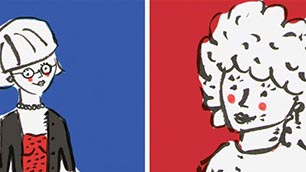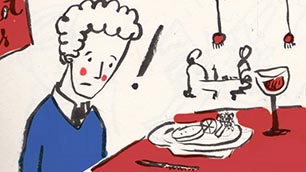INTRODUCTION TO FRENCH VERBS
A verb may be defined as the “action word of the sentence.”
INFINITIVES & CONJUGATIONS
You need to know the difference between the verb's infinitive and finite forms or conjugated forms. English infinitives are always preceded by ‘to’: to eat, to sleep, to talk. These verbs are called infinitives because they are not bound by time. From the infinitive, we derive the conjugated forms of a verb. They refer to events with a particular tense: past, present, future.Regular French verbs fall into 3 classes based on the last 2 letters of the verb. Each class has a different pattern of conjugation. We refer to the 3 classes as premier groupe (first group or conjugation), deuxième groupe (second group or conjugation) and troisième groupe (third group or conjugation).
Examples of Premier Groupe (-er verbs):
| danser - to dance regarder - to watch |
Examples of Deuxième Groupe (-ir verbs):
| finir - to finish obéir - to obey |
Examples of Troisième Groupe (-re verbs):
| vendre - to sell entendre - to listen |
-ER VERBS IN THE PRESENT TENSE
As we’ve seen, there are 3 major groups of regular verbs in French: -er, -ir, -re. Since -er verbs are the most numerous, they are considered the first conjugation or first group. To conjugate these verbs, you need to follow 2 steps:| 1. drop the -er from the infinitive to form the stem 2. add the -er endings to the stem |
Different tenses have different endings. The endings below are for forming the present tense.
PARLER (to speak) | |
| Je parle | Nous parlons |
| Tu parles | Vous parlez |
| Il/elle parle | Ils/elles parlent |
-e, -es, -e, -ons, -ez, -ent are the endings you will use from all verbs that belong to the first group. Easy, right? You do need to learn the endings by heart.
Let’s learn a few useful verbs from the premier groupe (first group).
| aimer - to like | habiter - to live |
| demander - to ask | regarder - to watch |
| détester - to hate | travailler - to work |
| écouter - to listen | étudier - to study |
| chercher - to look for | trouver - to find |
PRONUNCIATION
Je changes to j’ before a verb starting with a vowel or a silent h. This is called an “élision”. You have already seen it with avoir in the first person: j’ai. Here are a few more examples: j’aime, j’habite, j’écoute.Note that the s in plural pronouns (nous, vous, ils, elles) is usually silent like in nous demandons. When these pronouns are followed by a verb that begins with a vowel sound or silent h, the silent s is pronounced as a /z/ and links the pronoun to the verb. We’ve seen that phenomenon with nous avons, vous avez, ils ont, elles ont already. It’s called a liaison!
Examples:
Ils écoutent de la musique.They listen to music.
Nous aimons danser.
We love dancing.
Vous écoutez le professeur.
You listen to the teacher.
DEFINITE ARTICLES
Most nouns in French need to be introduced or ‘determined’ by an article. We’ve already learned about the indefinite articles (un, une, des). Today, we’ll learn about definite articles. Remember that French articles are masculine or feminine, singular or plural according to the gender and number of the noun they determine.| Masculine singular: | le (l’) | le professeur |
| Feminine singular: | la (l’) | la leçon |
| Masc. and fem. plural: | les | les problèmes |
ELISION and LIAISON
Note that le and la both become l’ when they precede a noun beginning with a vowel or a silent h: l’escargot, l’université. It’s the élision we used for verbs earlier.Unlike le and la, les cannot be contracted. When les is followed by a word starting with a vowel, the silent final s of les is pronounced, making a /z/ sound: les insectes, les escargots. This is our liaison again.
I’m sure by now you’ve figured that the liaison and the élision are very characteristic of French!
EXPRESSION of LIKES and DISLIKES
There are many uses to the definite articles in French. We’ll focus on just one for now. Le, la and les are used with verbs of preference, such as aimer, préférer, détester (all first group verbs!) Note how the English omits the article in such general statements.Examples:
Il aime les croissants.He likes croissants.
Elles détestent la cuisine française.
They hate French food.
Je n’aime pas le café.
I don’t like coffee.





























